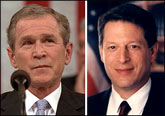Remember the eager young Naderites? Although it seems like another lifetime, it was only 15 months ago that supporters of the Green Party were telling us, with a sense of foreboding in their cracking voices, that there was “no difference” between presidential candidates Al Gore and George W. Bush. In the Naderite view, both were shills of corporations who would pursue policies that differed in their despicableness only in degree.
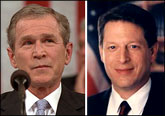
One of these men is not like the other.
It was a laughable argument, even then — one of the stupidest ever made in modern U.S. politics. True, it was mildly amusing to witness people who often couldn’t name their own members of Congress become suddenly seduced by dreams of federal matching funds. (Did nobody else remember John Anderson? Patrick Buchanan?) But the end result has been a near-disaster for the issue that was often most dear to Ralph Nader’s supporters: the environment.
If the past year has shown us anything, it is that the difference between George W. “Big Business” Bush and Al “Earth-in-the-Balance” Gore is significant indeed. Although some of the fears that Western environmentalists held about a Bush win have not come to pass (no monument designations have been rescinded, for example), many others have. Last month marked the one year anniversary of Bush’s inauguration, so this is as good a time as any to reflect on the changes he’s made in environmental policy. The verdict? What a difference a year — and a president — makes:

Norton has faced a gale of opposition from enviros.
January 2001. Upon entering office, Bush suspends implementation of most of former President Clinton’s late-term executive orders regarding the environment, including the “roadless rule” protecting 60 million acres of national forest, new standards for arsenic in drinking water, and a phased-in ban of snowmobiles in Yellowstone National Park. To ease California’s electricity crunch, the U.S. EPA lifts air-pollution standards for California power plants. Gale Norton, dubbed “James Watt in a skirt” by one enviro for her libertarian views, is approved by the Senate as Interior secretary, and former Sen. Spencer Abraham (R-Mich.), who tried to abolish the Energy Department while in Congress, is approved as Energy secretary.
February 2001. Norton announces that the administration will seek to “adjust the boundaries” of Clinton-designated national monuments. Bush, readying his budget, plans to cut Interior Department funding for environmental policy enforcement by 7 percent. The Republican-controlled Senate introduces a bill that would allow drilling in the Arctic National Wildlife Refuge, a proposal that becomes the cornerstone of Bush’s energy policy.
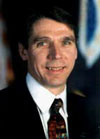
Bye, Mike!
March 2001. Bush reverses a campaign pledge by announcing that he will not order mandatory reductions of carbon dioxide emissions from the nation’s electrical plants. He also withdraws from the Kyoto Protocol on global warming. The U.S. EPA delays new rules regulating hard-rock mining and cancels the implementation of the arsenic rule, inciting a national controversy. The president nominates mining industry lobbyist J. Steven Griles for Interior deputy secretary. Mike Dombeck, the most pro-conservation head of the U.S. Forest Service in decades, announces his retirement.
April 2001. Breaking another campaign pledge, Bush abandons plans to invest $100 million per year in rainforest conservation. Bennett Raley, who once testified that the Endangered Species Act should be repealed, is nominated as Bush’s assistant secretary for water and science. The Interior Department seeks to limit citizen-initiated lawsuits involving the Endangered Species Act. Vice President Dick Cheney, heading up Bush’s secret energy task force, meets with Enron executives for advice.
May 2001. The Bush administration places a freeze on new proposals for expanding the national park system. The president nominates James Connaughton, notorious for his legal defense of General Electric in Superfund fights with the EPA, to be the chair of his Council on Environmental Quality, and Congress approves Linda Fisher, former head of Monsanto’s government affairs office, as second-in-command at the EPA. A federal judge warns the administration that it could be held in contempt of court if it fails to remove cattle from parts of California’s Mojave Desert in order to protect the endangered desert tortoise. Bush releases his energy plan, devised in secret by a task force headed by Cheney. The administration announces it will uphold but modify the roadless rule.
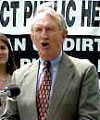
Jim Jeffords’ declaration of independence.
June 2001. The chickens come home to roost: Vermont Sen. Jim Jeffords, citing Bush’s hostile environmental policies, leaves the Republican Party to become an Independent, handing control of the Senate to the Democrats. Norton announces she will block plans to reintroduce the grizzly bear in Idaho, killing a landmark compromise between local environmentalists and industry that would have allowed reintroduction. During the president’s first summit with the European Union, protesters on the continent deride Bush for his global warming policies. Former timber lobbyiest Mark Rey is nominated for Agriculture undersecretary for natural resources and environment.
July 2001. The administration announces it will open 1.5 million acres of the Gulf of Mexico to oil drilling — although not near Florida Gov. Jeb Bush’s shorelines. William G. Myers, a former lobbyist for the National Cattlemen’s Beef Association, is confirmed as the Interior Department’s new solicitor, and regulation-phobic John Graham of Harvard’s Center for Risk Anaylsis is confirmed as the influential administrator of the Office of Information and Regulatory Affairs. Environmentalists sue the EPA for failing to meet deadlines for controlling hazardous air pollution in cities. More than 185 nations back the Kyoto Protocol at climate talks in Bonn, Germany. The U.S. is conspicuously absent.
August 2001. The Justice Department indicates that it will seek to overturn a federal court order blocking oil and gas exploration off the California coast. The General Accounting Office sends a letter to Bush demanding the release of documents relating to the deliberations of the Cheney-led Energy Task Force. Citing executive privilege, Bush refuses to reveal with whom Cheney met.
September 2001. On Sep. 11, terrorists attack the World Trade Center and the Pentagon. Bush wastes little time in using the attacks as a justification for decreased dependence on foreign sources of fossil fuel (read: increased coal mining and oil drilling in the U.S.). On Sep. 20, the Forest Service publishes a proposal that would allow forest supervisors to approve small-scale timber sales, road construction, mining projects, and off-road vehicle trails without seeking public input. The EPA issues a weak proposal regulating emissions of off-highway recreational vehicles, allowing dirtbikes and snowmobiles to continue fouling the air in national forests and parks.
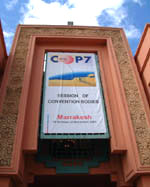
The U.S. blows off 160 nations in Marrakech.
Photo: Climate Network Europe.
October 2001. Disproving Bush’s assertion that the Kyoto Protocol was “fundamentally flawed” and unworkable, 160 nations (minus you-know-who) agree on a finalized set of rules for reducing global greenhouse emissions. The Interior Department says it will support an open-pit gold mine near El Centro, Calif. Without public notice, the BLM relaxes temporary management rules in 14 of the national monuments created by Clinton, allowing increased vehicle use and mining activity.
November 2001. Bush nominates Rebecca Watson as the Interior Department’s assistant secretary for land and minerals management. Watson, who has made a career representing the mining and logging industries, is also a member of the Board of Litigation for the far-right, anti-environmental Mountain States Legal Foundation.
December 2001. The White House grants initial approval to a set of administrative rules that would weaken the Clean Air Act by allowing coal-burning plants to bypass “new source” pollution standards when upgrading their facilities.
January 2002. The administration turns its attention to the Clean Water Act, as the U.S. Army Corps of Engineers announces new rules that make it easier for developers to build on wetlands. The administration also kills a Clinton-era program designed to improve automobile fuel efficiency in the near-term through the use of hybrid engines; instead, Bush says he’ll back research into hydrogen fuel cells, which should be available to consumers who wish to reduce their contribution to global warming in about, oh, 20 years.
Now tell me truly: Do you really think Al Gore would have been just as bad?
